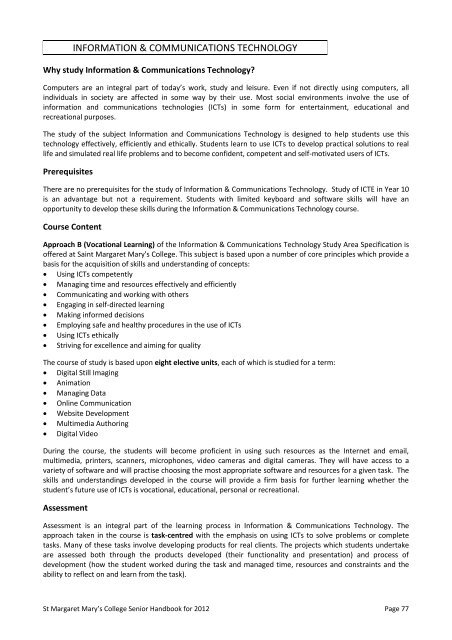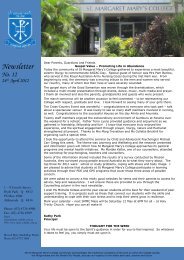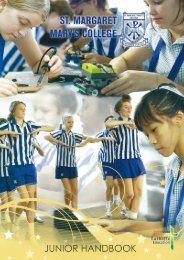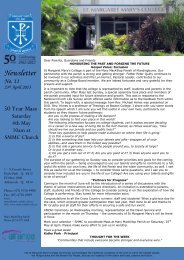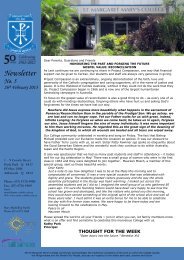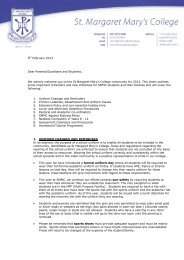SENIOR HANDBOOK for 2012
PRINCIPAL'S MESSAGE - St Margaret Mary's College
PRINCIPAL'S MESSAGE - St Margaret Mary's College
- No tags were found...
Create successful ePaper yourself
Turn your PDF publications into a flip-book with our unique Google optimized e-Paper software.
INFORMATION & COMMUNICATIONS TECHNOLOGY<br />
Why study In<strong>for</strong>mation & Communications Technology?<br />
Computers are an integral part of today’s work, study and leisure. Even if not directly using computers, all<br />
individuals in society are affected in some way by their use. Most social environments involve the use of<br />
in<strong>for</strong>mation and communications technologies (ICTs) in some <strong>for</strong>m <strong>for</strong> entertainment, educational and<br />
recreational purposes.<br />
The study of the subject In<strong>for</strong>mation and Communications Technology is designed to help students use this<br />
technology effectively, efficiently and ethically. Students learn to use ICTs to develop practical solutions to real<br />
life and simulated real life problems and to become confident, competent and self-motivated users of ICTs.<br />
Prerequisites<br />
There are no prerequisites <strong>for</strong> the study of In<strong>for</strong>mation & Communications Technology. Study of ICTE in Year 10<br />
is an advantage but not a requirement. Students with limited keyboard and software skills will have an<br />
opportunity to develop these skills during the In<strong>for</strong>mation & Communications Technology course.<br />
Course Content<br />
Approach B (Vocational Learning) of the In<strong>for</strong>mation & Communications Technology Study Area Specification is<br />
offered at Saint Margaret Mary's College. This subject is based upon a number of core principles which provide a<br />
basis <strong>for</strong> the acquisition of skills and understanding of concepts:<br />
Using ICTs competently<br />
Managing time and resources effectively and efficiently<br />
Communicating and working with others<br />
Engaging in self-directed learning<br />
Making in<strong>for</strong>med decisions<br />
Employing safe and healthy procedures in the use of ICTs<br />
Using ICTs ethically<br />
Striving <strong>for</strong> excellence and aiming <strong>for</strong> quality<br />
The course of study is based upon eight elective units, each of which is studied <strong>for</strong> a term:<br />
Digital Still Imaging<br />
Animation<br />
Managing Data<br />
Online Communication<br />
Website Development<br />
Multimedia Authoring<br />
Digital Video<br />
During the course, the students will become proficient in using such resources as the Internet and email,<br />
multimedia, printers, scanners, microphones, video cameras and digital cameras. They will have access to a<br />
variety of software and will practise choosing the most appropriate software and resources <strong>for</strong> a given task. The<br />
skills and understandings developed in the course will provide a firm basis <strong>for</strong> further learning whether the<br />
student’s future use of ICTs is vocational, educational, personal or recreational.<br />
Assessment<br />
Assessment is an integral part of the learning process in In<strong>for</strong>mation & Communications Technology. The<br />
approach taken in the course is task-centred with the emphasis on using ICTs to solve problems or complete<br />
tasks. Many of these tasks involve developing products <strong>for</strong> real clients. The projects which students undertake<br />
are assessed both through the products developed (their functionality and presentation) and process of<br />
development (how the student worked during the task and managed time, resources and constraints and the<br />
ability to reflect on and learn from the task).<br />
St Margaret Mary’s College Senior Handbook <strong>for</strong> <strong>2012</strong> Page 77


